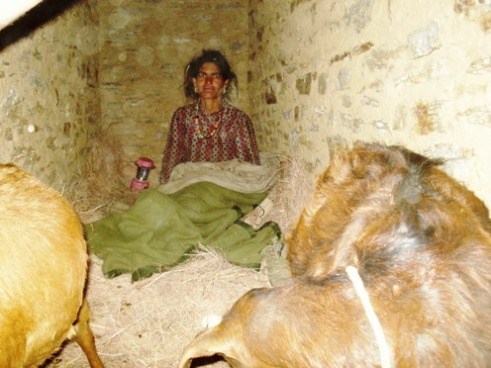TIKAPUR: Chhaupadi practice, the tradition which banishes menstruating women/ girls and post-partum mothers from home for certain days still exists in Kailali, a Tarai district in the Sudurpashim state.
It means that women and girls here continue to suffer this harmful practice and subject to its consequences despite its criminalization by the parliament in 2017.
This custom forces women during their natural cycle and new mothers to leave home and stay in makeshift huts or cowsheds putting their lives at risk for several consequences like attack from wild animal, snake bite, rape, sexual harassment and so on.
The stay in chhaugoth is more challenging, daunting and uncomfortable for its observers during monsoon.
Rusma BK of Tikapur-2 said when she is bleeding, she is forced to exit the home to stay in Chhaugoth. As she shared there are 10 such huts in her settlement where women spend during the first five days of menstruation.
“We are very uncomfortable in a congested and poorly ventilated hut. We get totally wet when it is raining. Last year, our family was told to demolish the hut by the ward office and almost all followed the direction but it were my in-laws who resisted the instruction”, she said, adding “I fear bites from poisonous snakes mainly in rains.”
BK does not entertain her days in the Chhaugoth, does not like to go here, but she has no guts to go against the command of her in-laws. As she said, she could not dare to unlearn the practice.
Last year, the Lamkichuha and Tikapur municipalities launched the Chhaupadi demolition campaign targeting rural settlement. But, women here said the removal of Chhaugoth has not brought any change in their real life. The treatment of family and society towards menstruating women and girls has remained the same as in the past. Under this circumstance, they reside in isolation within the home.
There was a chhaugoth (the makeshift hut where menstruating women are made to live during their periods) in the premises of Rupa Chhetri’s house at Lamkichuha. A team of people’s representatives and police pulled it down last year. But although the chhaugoth was demolished, Rupa’s problem of staying separate from the family during her period did not end there.
“All the people throughout the village demolished the chhaugoth. But I still have to live separate from the family during my period. I live in a shed adjoining the house,” she said. According to her, she wanted to live inside the house but her family, especially her mother-in-law would not let her stay together with family.
Similarly, the chhaugoth at the house of Sangeeta Saud of Tikapur-8 was demolished by a team of people’s representatives and police last year. But her problem was not over. She is compelled to share a pen for keeping goats.
“They say the family members fall ill if a menstruating woman lives inside the house together with the family. I could not revolt. I have kept a bed in the pen and sleep there during my periods thinking that it is only for four days,” Saud shared her problem.
Last year the local levels had run a campaign of demolishing chhaugoths, which had brought a kind to awareness in the area. The Lamki Chuha municipality demolished scores of chhaugoths while Tikapur municipality pulled down 37 chhaugoths last year.
The local levels are still operating the campaign of demolishing chhaugoth but it has been affected due to the coronavirus pandemic. “We demolished the chhaugoths for two days last year. We had a plan to continuing this but had to stop due to the COVID-19,” said deputy mayor Keshari Bista, adding that they have appealed to the citizens to voluntarily demolish the chhaugoths at their respective local level wards.
Chairperson of Tikapur-2, Prakash Budha remembered that there were 37 chhaugoth in his ward last year.
He said, “Some chhaugoths have been demolished after we decided to stop providing services being provided by ward. We will demolish the remaining chhaugoths ourselves.”
Tikapur municipality had allocated Rs 200,000 last year to end this ill practice. Of the budget, only Rs 33,200 was spent, said Chief of Women, Children and Social Welfare Section, Sangita Saha.
Saha shared, “We failed to continue the campaign due to coronavirus pandemic. A policy has been taken to declare Tikapur municipality as chhugoth-free municipality net year. We are in a camping to change the mindset of looking women during their mensuration period. It will not be possible to change such mindset all of sudden but can be changed gradually.”
Provision of three months jail-term and fine to those forced to live in chhaugoth has been mentioned in the Act.
The government had directed the local levels across the nation to launch campaign against chhaupadi ill practice after the death of a woman in chhaugoth in Achham last year.
A woman right activist Kalpana Upadhyaya said, “Family should be sensitive for the security of daughters and daughter-in-law. It is necessary to bring change in the mentality of thinking menstruation as crime.” RSS









Comment